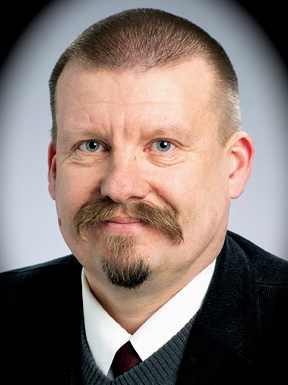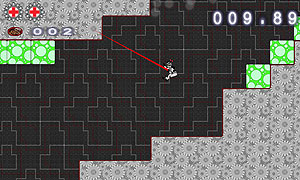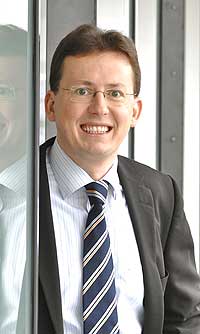Petri Myllymäki to be director of HIIT

Petri Myllymäki, professor at the department, has been elected director of HIIT (Helsinki Institute for Information Technology), the joint research institute of the University of Helsinki and Aalto University, for the five-year period starting on 1 August, 2015. Petri will be following Professor Sami Kaski of Aalto University in this post. Since the post of director of HIIT is a fulltime job, Petri (PM) will be relieved of his own professorial duties for the same period, and so the head of the department (JP) saw fit to conduct an exit interview with him.
JP: Why did you apply for the post as director of HIIT?
PM: Objectively, my motive was the important mission of HIIT, now and in the future. My personal motive was that I’ve been working as a professor and principal investigator for a long time now, and I was looking for new challenges. Now I will gain close insight into the parts of HIIT that I haven’t known before, for example.
JP: What do you think is the current status of computer science in Finland, and what position does HIIT hold in the research field? Does HIIT have its own profile?
PM: The status is good, but it could be better. The spearhead of Finnish computer science, the Helsinki region, is close to the top of Europe (and the world), but we still have a way to go to reach the absolute summit. HIIT is a significant player in reaching this goal, as it offers the framework for the University of Helsinki and Aalto University to collaborate, promoting a joint venture to the top, which would be harder separately. HIIT has especially profiled itself through quality research into data science, which is a good example of a more extensive and ambitious theme that neither university would be able to invest in sufficiently alone. In general, digitalisation is a huge opportunity for the Helsinki region and HIIT.
JP: How could we improve the research into computer science in Finland?
PM: It can be improved by recruitment of top scientists, which in turn requires efficient branding (e.g. the stamp ‘Helsinki ICT’). The restricted funds should be used to support collaborative research areas to gain a better impact than currently.
JP: In which direction, and using which methods, will you develop HIIT?
PM: I’m not going to fix what’s not broken; according to the Scientific Advisory Board of HIIT, it has done excellent work so far, so that should continue. It is too soon to envision new research endeavours; we’ll see what happens to HIIT during e.g. the structural development process (RAKE). I think bottom-up is a good direction for new research ideas, in addition to the top-down strategic outlines. I will try to delete the problems stemming from history that have been caused by HIIT's position as an 'ivory tower' separated from the base departments.
JP: Should we develop the collaboration between the department and corresponding departments at Aalto? In which way and how much? What is the role of HIIT in this collaboration?
PM: We already have other collaborations between the department and Aalto, besides HIIT, such as the doctoral education network. We should increase our cooperation and coordination within our basic education, as well, and HIIT would be a natural aid for that. Some day, we may even be looking at a shared department of the Helsinki region, or a faculty or even a university.
JP: Will we see you at the department in the future, or will you completely disappear to Otaniemi?
PM: Even as director of HIIT, I will still have my own research group working at the department. In future, I will work in Otaniemi more than now, about fifty-sixty to Kumpula. In my teaching, I will be focusing more on tutoring under- and postgraduates, and less on classroom courses.
JP: Do you have any elated ‘exit words’?
PM: Our general motto in CoSCo was ‘Just do it,’ which Nike later stole so rudely. In the Doctoral school in natural sciences, I’ve introduced the motto ‘Mostly harmless’ to illustrate how the administrative bodies should affect the lives of researchers. This aspect will be part of my future work, as one of the pleasant tasks of the director is to consider the relationship between administration and research organisation.

 Mika Urtela and Hannu Pajula, graduates of the Department of Computer Science, are realising their piña colada-flavoured dreams in their game-producing company, Soul Aim Studios. This is the beginning of their story. The piña colada part of it has not come true yet, but they're working at it.
Mika Urtela and Hannu Pajula, graduates of the Department of Computer Science, are realising their piña colada-flavoured dreams in their game-producing company, Soul Aim Studios. This is the beginning of their story. The piña colada part of it has not come true yet, but they're working at it. FiDiPro - the Finland Distinguished Professor Programme - enables distinguished international researchers to work and team up with the 'best of the best' in Finnish academic research. Financed by the Academy of Finland and Tekes, FiDiPro makes it possible to recruit highly merited scientists who are able to commit to long-term cooperation with a Finnish university or research institute.
FiDiPro - the Finland Distinguished Professor Programme - enables distinguished international researchers to work and team up with the 'best of the best' in Finnish academic research. Financed by the Academy of Finland and Tekes, FiDiPro makes it possible to recruit highly merited scientists who are able to commit to long-term cooperation with a Finnish university or research institute. The Faculty of Science invited Linus Torvalds to be its honorary alumnus in Kumpula. During its alumni event, the faculty also named one of its lecture halls after Linus Torvalds. On the event held on Thursday 17 March, young researchers were the main speakers, and the 350 guests on the science campus gave them their full attention.
The Faculty of Science invited Linus Torvalds to be its honorary alumnus in Kumpula. During its alumni event, the faculty also named one of its lecture halls after Linus Torvalds. On the event held on Thursday 17 March, young researchers were the main speakers, and the 350 guests on the science campus gave them their full attention.